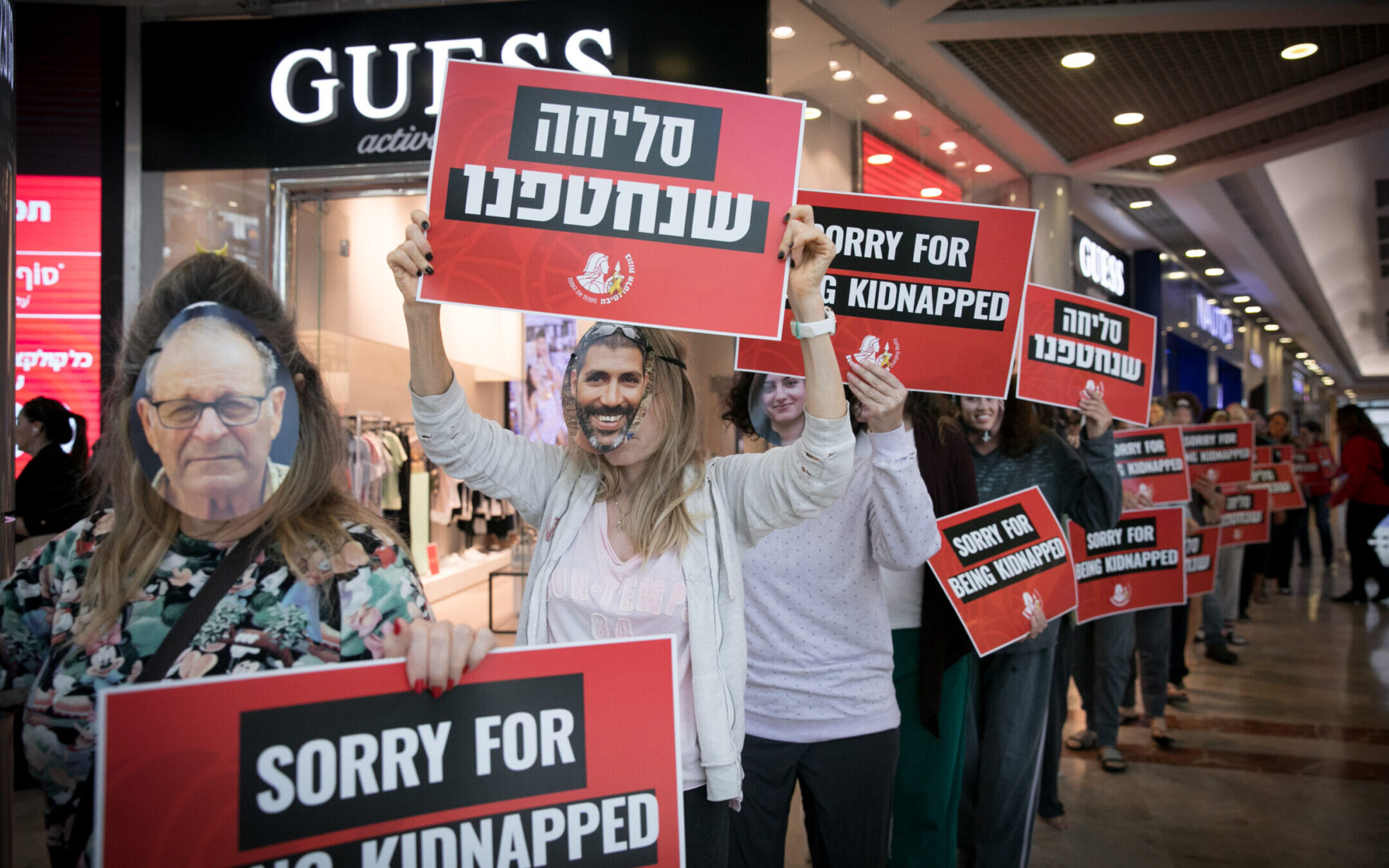Israel returns to hostage talks as Netanyahu presents postwar plan for Gaza governance
Israeli media report Hamas continues to demand that any deal include the withdrawal of Israeli forces from Gaza, which Israel has rejected

Israelis protest calling for the release of Israeli hostages held by Hamas terrorists in Gaza, at Azrieli Mall in Tel Aviv Feb. 21, 2024. (Miriam Alster/Flash90)
(JTA) — Israeli negotiators have arrived in Paris to participate hostage talks, in a sign that officials believe, that a deal can be reached with Hamas to secure the release of the 134 Israelis held in Gaza.
Israel had initially sat out this round of talks, reportedly at the instruction of Prime Minister Benjamin Netanyahu. Now, under pressure from the Biden administration and family members of the hostages, Netanyahu has dispatched a negotiating team that includes the heads of Israel’s top security forces, the Mossad and Shin Bet.
It was unclear whether the talks would lead to the release of the hostages, of whom about 100 are thought to be alive. Israeli media is reporting that Hamas is continuing to demand that any deal include the withdrawal of Israeli forces from Gaza, which Israel has said it will not do.
The talks come at a pivotal time in the war, which began four and a half months ago, as world leaders including U.S. President Joe Biden have warned Netanyahu against carrying out Israel’s threat to invade Rafah, the southern Gaza city where an estimated 1.5 million Palestinians are sheltering, without a plan to protect civilians.
On Thursday night, Netanyahu presented his cabinet with a formal plan for post war governance of Gaza for the first time, delivering a one-page proposal on Thursday night that would have “local officials” who have never been involved in terrorism play a leadership role. The Palestinian Authority, which governs the West Bank, immediately rejected the plan, saying that it would not move toward Palestinian statehood, which Netanyahu roundly rejects but is gaining favor among other world leaders amid the mounting devastation in Gaza. Netanyahu has also repeatedly rejected placing the P.A. in charge of Gaza, which Biden favors.
The number of Palestinians killed during the Israeli offensive neared 30,000 on Friday, according to the Hamas-run Gaza Health Ministry, which does not differentiate between civilians and combatants. Israel recently said it believes it has killed 12,000 Hamas fighters during the war.
The hostage and ceasefire talks are expected to take up to two weeks, with a first phase to settle on a general outline and a second, including Hamas directly, that would hammer out specifics of how long a ceasefire would last, in what order the hostages would be freed and which Palestinian security prisoners Israeli would release.
Hamas released more than 100 hostages in November as part of a weeklong ceasefire, in exchange for some 300 women and minors held by Israel. The number and profile of the security prisoners who would be released as part of a new deal is expected to be much higher.
Weekly rallies by families of the hostages and their allies in Tel Aviv have taken an increasingly antagonistic tone against Netanyahu, with chants of “Shame” — familiar from last year’s anti-government protests over Israel’s judiciary — lasting for over a minute last Saturday.
This article originally appeared on JTA.org.
A message from our Publisher & CEO Rachel Fishman Feddersen

I hope you appreciated this article. Before you go, I’d like to ask you to please support the Forward’s award-winning, nonprofit journalism during this critical time.
We’ve set a goal to raise $260,000 by December 31. That’s an ambitious goal, but one that will give us the resources we need to invest in the high quality news, opinion, analysis and cultural coverage that isn’t available anywhere else.
If you feel inspired to make an impact, now is the time to give something back. Join us as a member at your most generous level.
— Rachel Fishman Feddersen, Publisher and CEO























